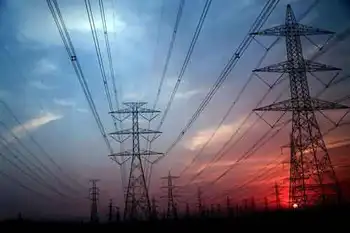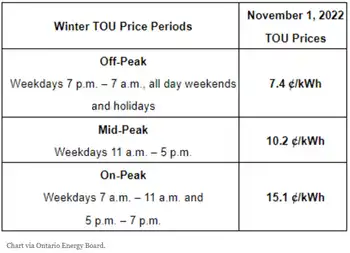Hydro prices to rise in spring, Ontario minister says
By TORONTO STAR
Substation Relay Protection Training
Our customized live online or in‑person group training can be delivered to your staff at your location.

- Live Online
- 12 hours Instructor-led
- Group Training Available
While Duncan declined to comment specifically on the price hike, he appealed to Ontarians to save electricity.
"We've been encouraging conservation since the day we took office. I'd encourage people to conserve. It's good for the environment, it's good for the pocketbook," the minister said.
"I'm not going to have anything to say about the price increase.... They're zeroing in on different figures, but we'll have an announcement in due course."
The Ontario Energy Board is calculating the amount that prices will rise.
Asked by a reporter if Ontarians would "be angry" at the hike, which will be disclosed within the next six weeks and in effect as of May, Duncan was solemn.
"I've never heard anyone being happy with an increase in price in anything as essential as electricity," he said. "A price change is coming down the road, but my experience with these things is people are never happy."
Ontario homeowners now pay 4.7 cents per kilowatt-hour for the first 750 kilowatts used monthly and 5.5 cents for each kilowatt-hour over and above that.
While the Liberals promised in the 2003 election to retain the previous Conservative government's artificially low price cap of 4.3 cents per kilowatt-hour, they abandoned that after taking office.
"We want to put electricity pricing on a responsible and sustainable footing," said Premier Dalton McGuinty.
"We know that we can't go back to the past, where we artificially depressed prices, which looked good on the one hand, but on the other we accumulated a tremendous debt, which we're now all paying for," McGuinty said.
"So we want to make sure we're moving in a prudent and responsible way forward."
Meanwhile, the government received a grade of A from the Ontario Clean Air Alliance for its progress toward shutting down the province's coal-burning generating stations. The Liberals have pledged to close the Lakeview station this year and the remaining coal-burning stations by 2007.
The alliance noted approvingly that coal-fired plants produced 25 per cent of the electricity generated in the province in 2003, but only 17 per cent last year.
The one blot on the government's record, said the alliance's Jack Gibbons, was the province's decision to spend close to $1 billion on restarting a second mothballed reactor at the Pickering A nuclear station. It's to return to service this fall.
The alliance says the money would have been better spent on conservation programs, increasing generation from renewable sources such as wind or sunlight, or building efficient natural gas-fuelled plants.
But preliminary figures from the Independent Electricity System Operator show that it was increased nuclear generation in 2004 that allowed the coal-fired plants to cut back.
While coal's share dropped 8 percentage points, the share produced by nuclear stations increased 7 percentage points in 2004, to 50 per cent from 43 per cent. Two laid-up reactors returned to service late in 2003 and another early in 2004.











